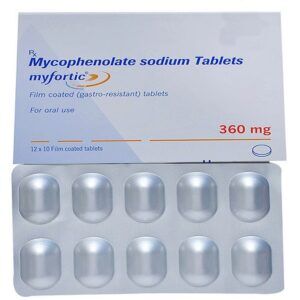Myfortic 360mg Tablet: Your Guide to Transplant Recovery

Table of Contents
Understanding Myfortic 360mg Tablet: Safeguarding Organ Transplants:
 Myfortic 360mg Tablet, produced by Novartis India Ltd, is a vital medication for transplant patients. It helps prevent organ rejection after transplantation, such as kidneys, hearts, or livers. The tablet contains Mycophenolate sodium (360mg), which weakens the body’s immune system, reducing the risk of rejection.
Myfortic 360mg Tablet, produced by Novartis India Ltd, is a vital medication for transplant patients. It helps prevent organ rejection after transplantation, such as kidneys, hearts, or livers. The tablet contains Mycophenolate sodium (360mg), which weakens the body’s immune system, reducing the risk of rejection.
Patients must follow their doctor’s instructions precisely regarding dosage and administration. Myfortic can be taken with or without food but should always be swallowed whole. It’s crucial to take the medication consistently to prevent rejection of the transplanted organ.
While generally well-tolerated, common side effects include nausea, vomiting, diarrhea, abdominal pain, headache, and high blood pressure. If these side effects persist, patients should consult their doctor.
Safety precautions include avoiding Myfortic during pregnancy and breastfeeding due to possible harm to the baby. Drinking alcohol with Myfortic typically doesn’t cause issues. It’s unlikely to affect driving ability. Patients with severe kidney disease should use caution, and dose adjustments may be needed.
If a dose is missed, take it as soon as possible. However, if it’s nearly time for the next dose, they should skip the missed one to avoid doubling up. Overall, Myfortic 360mg Tablet is essential for transplant patients, requiring careful adherence for effectiveness and safety.
Uses of Myfortic Tablet:
- Prevention of organ rejection in transplant patients
Benefits of of Myfortic Tablet:
Myfortic 360mg Tablet offers significant benefits to transplant patients by preventing organ rejection. As an immunosuppressant, it lowers the immune response, reducing the risk of the body attacking the transplanted organ. This medication can be used in combination with other drugs to effectively suppress the immune system, allowing the body to accept the new organ. By taking Myfortic as prescribed, patients can enhance the success of their transplant and improve their overall quality of life. Its ability to prevent rejection and support long-term organ function makes it an invaluable asset in transplant care.
Side Effects:
Side effects of Myfortic 360mg Tablet are common and may include nausea, vomiting, diarrhea, abdominal pain, headache, and high blood pressure. Additionally, changes in white blood cell count may occur, leading to an increased risk of infections. There is also a possible risk of developing certain cancers due to the suppression of the immune system. Prompt medical attention is necessary if any unusual symptoms occur.
Common side effects of Myfortic:
- Vomiting
- Increased creatinine level in blood
- Anemia (low number of red blood cells)
- Acne
- Muscle pain
- Anxiety
- Breathlessness
- Diarrhea
- Abdominal pain
- Headache
- High blood pressure
- Bacterial infection
- Fungal infection
- Pneumonia
- Increased uric acid level in blood
- Electrolyte imbalance
- Decreased white blood cell count (neutrophils)
- Nausea
How to Use Myfortic Tablet?
Here are the points on how to use Myfortic Tablet:
- Adhere closely to your doctor’s instructions.
- Swallow the tablet whole.
- It can be taken with or without food.
- Avoid crushing, chewing, or breaking the tablet.
- Take Myfortic consistently as directed.
- Continue the medication, even if you’re feeling well.
If you have any concerns, consult your doctor or pharmacist.
Conclusion:
In summary, Myfortic 360mg Tablet is vital for preventing organ rejection after transplantation. By weakening the body’s immune response, it safeguards the transplanted organ from attack. Despite possible side effects, the benefits outweigh the risks for many patients. It’s crucial to follow the doctor’s instructions closely on dosage and usage. Regular monitoring and reporting any unusual symptoms are essential for overall health. Myfortic offers hope for transplant patients, improving their quality of life and enhancing transplant success.


 Anti Cancer Drugs
Anti Cancer Drugs Hepatitis C
Hepatitis C Meds for HIV
Meds for HIV Ayurvedic Medicine
Ayurvedic Medicine Transplant Medicine
Transplant Medicine Respiratory System
Respiratory System +91-9811604444/ 9811604424/ 9999064250
+91-9811604444/ 9811604424/ 9999064250  8(800)100-47-90
8(800)100-47-90